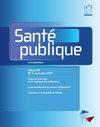Après la pilule. Le choix contraceptif des jeunes femmes à l’épreuve du rejet des hormones
IF 0.3
4区 医学
Q4 PUBLIC, ENVIRONMENTAL & OCCUPATIONAL HEALTH
引用次数: 0
Abstract
INTRODUCTION Although the pill is still the contraceptive method most commonly used by young women in France, since the ‘00s there has been a decline in its use and a questioning of its centrality in the contraceptive norm. This questioning is part of a growing climate of mistrust toward hormonal methods. PURPOSE OF THE RESEARCH Based on an analysis of a corpus of twenty-one interviews with women aged between twenty and twenty-eight on the subject of contraceptive choice, this article aims to provide information on the ways in which rejection of hormones is expressed and to determine its concrete effects on the interviewees’ contraceptive choices. RESULTS The survey shows the prevalence of mistrust of hormones among the young women interviewed. This mistrust is rarely rooted in their contraceptive experience; with a few exceptions, it seems to be more diffuse. This mistrust is most often expressed by women when it comes to justifying stopping the pill, the logistical burden of which becomes increasingly heavy as the years go by. However, the vast majority of women who reject the use of hormones continue to use medical contraception, including hormonal contraception, as long as it is perceived to be easier to use than the pill. CONCLUSIONS By questioning hormonal contraception, and the pill in particular, young women are denouncing the lack of choice: they are not asking for less contraception, but for contraception that is better suited to their needs.服药之后年轻女性的避孕选择面临激素排斥的考验
引言 尽管避孕药仍然是法国年轻女性最常用的避孕方法,但自二十世纪九十年代以来,其使用率有所下降,其在避孕规范中的核心地位也受到质疑。研究目的本文通过对 21 个年龄在 20 岁至 28 岁之间的女性进行的有关避孕选择的访谈进行分析,旨在提供有关拒绝荷尔蒙的表达方式的信息,并确定其对受访者避孕选择的具体影响。这种不信任很少源于她们的避孕经历;除少数例外情况外,这种不信任似乎较为分散。这种不信任最常表现在妇女为停止服用避孕药找理由时,因为随着时间的推移,停药带来的后勤负担越来越重。然而,绝大多数拒绝使用荷尔蒙的妇女继续使用药物避孕,包括荷尔蒙避孕,只要她们认为这 种避孕方法比避孕药更容易使用。
本文章由计算机程序翻译,如有差异,请以英文原文为准。
求助全文
约1分钟内获得全文
求助全文
来源期刊

Sante Publique
PUBLIC, ENVIRONMENTAL & OCCUPATIONAL HEALTH-
CiteScore
0.40
自引率
33.30%
发文量
252
审稿时长
>12 weeks
期刊介绍:
La revue Santé Publique s’adresse à l’ensemble des acteurs de santé publique qu’ils soient décideurs,
professionnels de santé, acteurs de terrain, chercheurs, enseignants ou formateurs, etc. Elle publie
des travaux de recherche, des évaluations, des analyses d’action, des réflexions sur des interventions
de santé, des opinions, relevant des champs de la santé publique et de l’analyse des services de
soins, des sciences sociales et de l’action sociale.
Santé publique est une revue à comité de lecture, multidisciplinaire et généraliste, qui publie sur
l’ensemble des thèmes de la santé publique parmi lesquels : accès et recours aux soins, déterminants
et inégalités sociales de santé, prévention, éducation pour la santé, promotion de la santé,
organisation des soins, environnement, formation des professionnels de santé, nutrition, politiques
de santé, pratiques professionnelles, qualité des soins, gestion des risques sanitaires, représentation
et santé perçue, santé scolaire, santé et travail, systèmes de santé, systèmes d’information, veille
sanitaire, déterminants de la consommation de soins, organisation et économie des différents
secteurs de production de soins (hôpital, médicament, etc.), évaluation médico-économique
d’activités de soins ou de prévention et de programmes de santé, planification des ressources,
politiques de régulation et de financement, etc
 求助内容:
求助内容: 应助结果提醒方式:
应助结果提醒方式:


